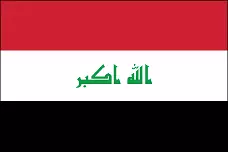The region was home to multiple famed civilizations, including Babylon, and these civilizations arose due to the land and animals present. With ample food supplies, the people could focus on more than simply survival so they turned to establishing governments, encouraging trade, education, and creating other forms of economy. Earlier than most areas, the people in the region shifted to an economy based on trade and bartering in addition to farming; again, most people in Iraq today work in numerous industries that encourage an exchange of goods, today often on a local scale, but farming and agriculture are the root of this economy.
In the 600s one of the greatest changes to the region's way of life arrived with the Arabs and their religion, Islam. These people took over the region, incorporating much of the past culture into their lives, but Islam changed many other aspects of daily life, changes that continue to the present. As Muslims, many of the people are quite conservative, they follow dietary restrictions, and regularly attend mosque. This religion also helps dictate relationships in Iraq, including relations between the sexes as men and women are not allowed to touch each other unless married or related.
To a lesser degree differing ethnic groups have different cultures and this is most pronounced when comparing the Arabs with the Kurds. The Kurds seek political independence and this has led to debates and arguments between the groups as well as different cultures arising from the differences in food, dress, and language to behaviors and beliefs.
Today many of the people in Iraq live a unique way of life as the country recovers from war in the 1990s and early 2000s. Life is focused on recovery, peace, stability, and economic growth, which is at least partially based on the oil industry. Education, healthcare, and economic sustainability are important parts of life, but in the present state these items are sadly secondary to survival and obtaining basic needs for many. Fortunately, in some regions this is not the case and generally, things are improving each year so the people's focus and attention can shift more to progress and growth rather than survival.
 The flag of Iraq is based on the Arab Liberation flag, which includes black to represent oppression, red for bloody struggles, and white to symbolize a bright future. In the middle of the flag is the Takbir, or the words Allah Akbar, which means "God is Great."
The flag of Iraq is based on the Arab Liberation flag, which includes black to represent oppression, red for bloody struggles, and white to symbolize a bright future. In the middle of the flag is the Takbir, or the words Allah Akbar, which means "God is Great."
Name: Republic of Iraq
Independence: October 3, 1932
Capital: Baghdad
Currency: Iraqi Dinar
Population: 31,858,481 (2013 estimate)
Ethnicity: Arab, Kurdish, & others
Language: Arabic & Kurdish
Religion: Shi'a & Sunni Muslim